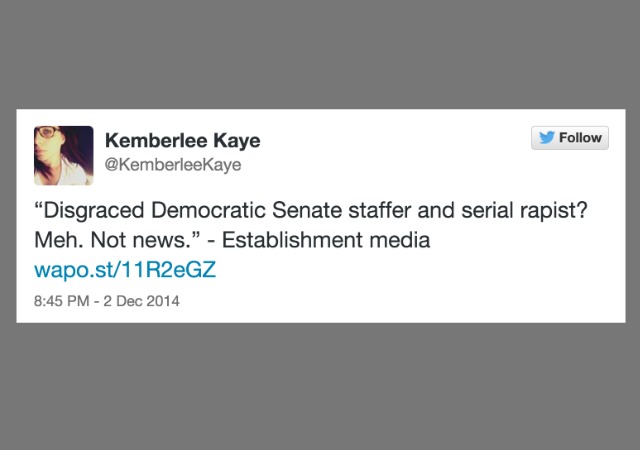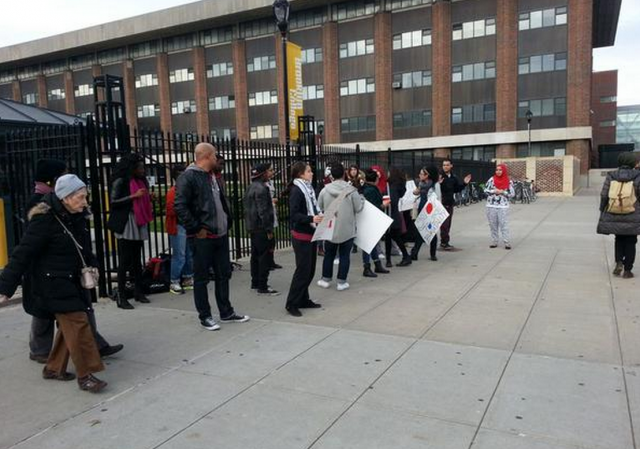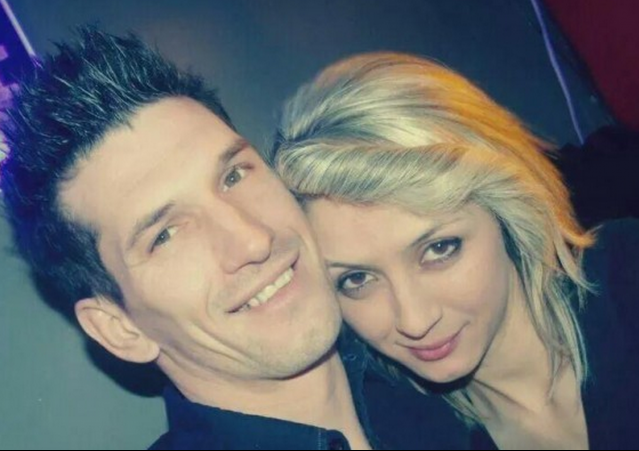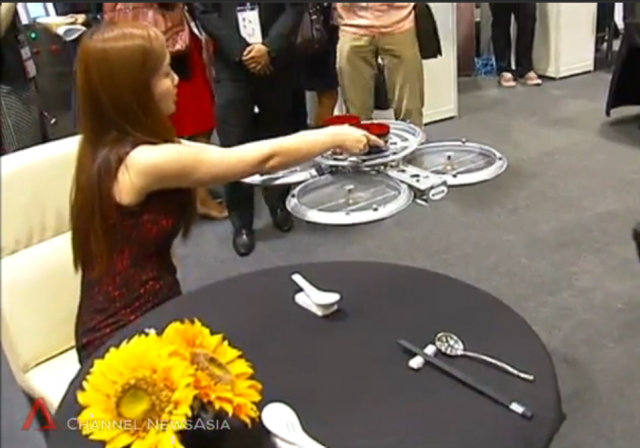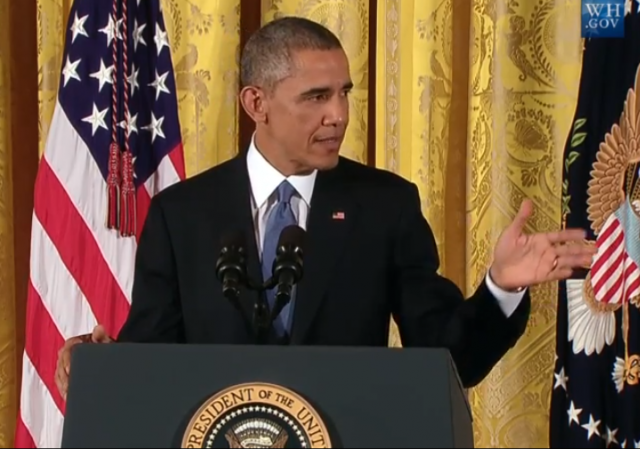Author: Kemberlee Kaye
Kemberlee Kaye
Kemberlee Kaye is the Senior Contributing Editor of Legal Insurrection, where she has worked since 2014 and is the Director of Operations and Editorial Development for the Legal Insurrection Foundation. She also serves as the Managing Editor for CriticalRace.org, a research project of the Legal Insurrection Foundation.
She has a background working in immigration law, and as a grassroots organizer, digital media strategist, campaign lackey, and muckraker. Over the years Kemberlee has worked with FreedomWorks, Americans for Prosperity, James O'Keefe's Project Veritas, and US Senate re-election campaigns, among others.
Kemberlee, her daughter, and her son live a lovely taco-filled life in their native Texas.
You can reach her anytime via email at kk @ legalinsurrection.com.
How the EPA is a giant tax dollar sinkhole
National #HandsUpWalkOut protest more like #SitDownStayAtWork
In the wake of events in the last weeks, including the non-indictment in the killing of Mike Brown and the senseless killings of Akai Gurley in New York and 12-year-old Tamir Rice in Cleveland, our communities are hurting and justifiably angered. What gives us hope in this moment of pain and anguish is the thousands of people who have poured into the streets of America to demand change.
From the #ShutItDown actions that have blocked major highways and intersections to the #BlackoutBlackFriday protests,the message is clear: No more business as usual. We can no longer do what we have always done and cooperate with a system that does not respect Black Lives. We will only get the change we want if we disrupt the daily order and insists that Black Lives Matter. If that means shutting down the entire country, that’s what we’ll do.
On Monday, Dec 1st people around the country will be walking out of their schools and places of work in solidarity with Ferguson communities across the country effected by police violence.
Where? It can be any central location at your school or the area where you work . Consider if there is a place that has relevance to social justice such as a monument, chapel, or scene of previous protests.
"Hands Up" refers to early reports that suggested Mike Brown had his hands up in the air as a sign of surrender when he was shot by police officer, Darren Wilson. Later, it was revealed this was not true.
Participants of "Hands Up Walk Out" were encouraged to post photos of their events online.
Not surprisingly, the largest turnouts seemed to have occurred at ivy league campuses and leftist organized marches, but even those were not particularly large. The rest? They were itty bitty. Take a look:I'm sure lots of other people took better pictures than this, but here is a glimpse of #HandsUpWalkout @Yale pic.twitter.com/76kUiy47Se — Heidi Knoblauch (@heidiknoblauch) December 1, 2014
Driver brutally murdered by hammer-wielding teens in St. Louis
Two juveniles are in custody Sunday, suspected in the death of a man beaten with hammers on a St. Louis street.
The victim, 32-year-old Zemir Begic, suffered injuries to his head, abdomen, face and mouth, according to police.
He was unconscious by the time officers arrived. Begic was taken to an area hospital, where he was pronounced dead, police said.
"Investigation revealed the victim was traveling in his vehicle when several juveniles approached his vehicle on foot and began damaging it.
"The victim exited his vehicle and the juveniles began yelling at the victim and striking him with hammers. After the assault, the juveniles fled the scene on foot," read an incident report.
Two suspects were later located and taken into custody, police said. They are 15 and 16.
A motive for the attack was not immediately clear. An investigation is ongoing.
Some reports indicate race has already been ruled out as a motive for the violent attacks, while others say motive is as of yet unclear. Police are still looking for two other suspects, a 16 year old black male and a 15 year old hispanic male, according to Fox News St. Louis.
First they came for the cashiers, then the waiters …
 According to Channel News Asia:
According to Channel News Asia:
Restaurant-goers in Singapore can expect to be served by autonomous flying robots – the world’s first commercial attempt – by the end of next year. Infinium-Serve, the autonomous flying robotic waiters, will be first launched at one of Timbre Group’s five outlets in Singapore. Infinium Robotics CEO Woon Junyang estimated the project to cost a “low seven-figure sum” for the five outlets, subject to final negotiations and certain variables of the actual deployment of the robots. Infinium Robotics signed a Memorandum of Understanding with Timbre Group on Oct 31. Both companies are seeking productivity-related government grants to help offset deployment costs. Mr Woon said he is confident that such robotic solutions will help alleviate the Singapore’s labour crunch. Introducing this technology into restaurants would take away mundane tasks of serving food and drinks, and allow human waiters to focus on higher-value tasks such as getting feedback from customers, he said. “This will result in an enhanced dining experience which will eventually lead to increased sales and revenue for the restaurants,” he added. A prototype of Infinium-Serve was showcased to Prime Minister Lee Hsien Loong at the inaugural launch of the National Productivity Month in early October.
Watch the new Star Wars: The Force Awakens trailer
"For the past 35 years, one of my greatest pleasures has been to see Star Wars passed from one generation to the next," said Lucas, chairman and CEO of Lucasfilm, in a statement. "It's now time for me to pass Star Wars on to a new generation of filmmakers."J.J. Abrams is both a writer and director for the latest Star Wars installment with an assist from George Lucas and Lawrence Kasden on the screenplay. Kasden was a co-writer for The Empire Strikes Back and Return of the Jedi. Carie Fisher, Harrison Ford, and Mark Hamill make appearances in The Force Awakens (although they're not show in this trailer).
On Giving Thanks
Wishing you a very Happy Thanksgiving...
Budweiser ditching iconic Clydesdales for zombies and Jay Z?
Happy Birthday William F. Buckley, Jr!
Remembering the voice of conservatism...
Obama quietly extends combat role in Afghanistan
Let’s play “What if a Republican said __________?”
1. Just call me Emperor. Also, kiss my ring.

Teens gag on Obama-lunches, tweet pics to #ThanksMichelleObama
The survey of school leaders revealed: — 83.7 percent of school districts saw an increase in plate waste. — 81.8 percent had an increase in cost. — 76.5 percent saw a decrease in participation by students. — 75 percent of school leaders want an increase in federal funding for school districts to comply with the new standards. — 60.3 percent want flexibility for school districts to improve their ability to provide good nutrition without harm to instruction, personnel, and other school district operations.With that in mind, it's easy to understand why the kids being served these meals weren't too terribly excited about eating their
8 Reasons to celebrate men on International Men’s Day
Objectives of International Men's Day include a focus on men's and boy's health, improving gender relations, promoting gender equality, and highlighting positive male role models. It is an occasion for men to celebrate their achievements and contributions, in particular their contributions to community, family, marriage, and child care while highlighting the discrimination against them.
The ability to sacrifice your needs on behalf of others is fundamental to manhood, as is honour. Manhood rites of passage the world over recognise the importance of sacrifice in the development of Manhood.
Men make sacrifices everyday in their place of work, in their role as husbands and fathers, for their families, for their friends, for their communities and for their nation. International Men's Day is an opportunity for people everywhere of goodwill to appreciate and celebrate the men in their lives and the contribution they make to society for the greater good of all.
Forgetting the whole "contributions and sacrifice" element, those not denouncing the day altogether have honed in on "improving gender relations and promoting gender equality bit."
The Guardian's take is that, "it's clear why women have their day but men don't really need the same. Perhaps fathers and sons should bond over domestic skills instead." Right. I can just see my Dad bonding with my brother-in-law over a spirited discussion on the best eco-friendly cleaning product for cleaning the bathroom sink...
The Washington Post praises IMD as another feminist day and a real opportunity for men to work on gender inequality because, "many of these men are surely blind to their own privilege and status in the world and within their own cultures." Ah yes, check your privilege, men. You have no idea just how good you have it. Just ask the comet scientist guy.
And the list goes on.
But as a devout patriarchal loyalist, I've compiled a non-exhaustive list of just a few reasons men are wonderful human beings.
“Almost awesome in its evilness” – Jonathan Gruber on Obamacare
Planned Parenthood organizes against TIME magazine poll to ban word “feminist”


George W. Bush: I refuse to criticize Obama to protect the presidency
Class act....
5 Reasons “feminists” can’t complain about comet scientist’s “sexist” shirt
No no women are toooootally welcome in our community, just ask the dude in this shirt. https://t.co/r88QRzsqAm pic.twitter.com/XmhHKrNaq5
— Rose Eveleth (@roseveleth) November 12, 2014
Thanks for ruining the cool comet landing for me asshole.
— Rose Eveleth (@roseveleth) November 12, 2014
What should've been the happiest day of this man's life for doing something no human being has ever in the history of our entire species done, turned into a tearful apology because of his choice of SHIRT. I kid you not:
The ultimate “Ed Schultz is bonkers” mashup
MSNBC is always good for a hacktastic laugh...
Donations tax deductible
to the full extent allowed by law.
CONTRIBUTORS
- William A. Jacobson
Founder
- Kemberlee Kaye
Sr. Contrib Editor
- Mary Chastain
Contrib Editor
- Mike LaChance
Higher Ed
- Leslie Eastman
Author
- Vijeta Uniyal
Author
- Stacey Matthews
Author
- Jane Coleman
Author
- Ben Smith
Weekend Editor
- Elizabeth Stauffer
Author
- Mandy Nagy
Editor Emerita
- Learn more about the Contributors


